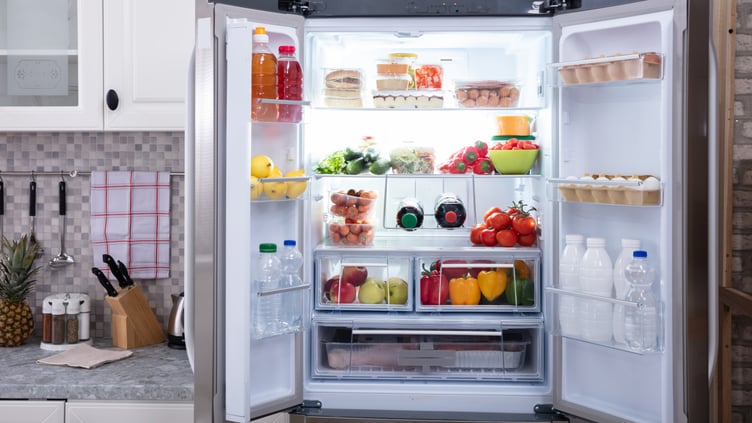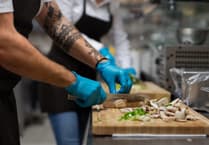Many fresh foods can be difficult to keep fresh and safe to eat for long periods of time and people are understandably concerned about eating food which is past is best in case it causes harm.
Bananas
“Bananas are a household staple in most UK homes, but they can be tricky to store properly and often the time frame between them being under-ripe to over-ripe is short lived.”
“The first step to keep bananas fresh for longer is to buy them when they’re still green, helping to give you the longest window when they’re at their best. You should remove them from their plastic packaging, which traps the moisture released by the fruit as they ripen, making them ripen even faster.”
“You should also separate them from other fruit, as being in close proximity to other ripening fruits will speed up the process for both. Instead, keep them in an open bowl on the countertop, away from other fruits.”
Sarah has advised to stop refrigerating bananas whilst they’re still ripening, as it can delay the process but once they are ripe they can be stored in the fridge.
“They should be good to eat for a week or more. You can also freeze bananas, but this is best when making smoothies or baking, as frozen bananas won’t make the nicest snack.”
Avacados
“Avocados are a popular, healthy breakfast treat, but they can be difficult to keep ripe. When purchasing the fruit, make sure you’re buying them at the right stage of ripening.”
Sarah has described that an unripe avocado will feel firm to the touch and will last on estimate for a week, whilst a ripe fruit will feel slightly soft and will last for on average three days.
“Similar to bananas, you should avoid storing avocados near other fruits to slow down the ripening process. They can also be stored in the fridge, but only once they’re ripe, where they will last for three days to a week. Avocados are also safe to be frozen, where they can be stored for up to six months.”
Bread
Food Expert, Sarah said: “It’s the age-old question, should you bin or keep bread with spots of mould?”
“Mouldy bread is generally best thrown away, as the mould will likely have spread much further through the loaf than is actually visible. Buying sliced bread is a good, cheaper option for keeping your bread fresh for longer, as it could take longer to spread throughout the loaf.”
Sarah advises to keep the bread fresh for longer, it’s best to keep it covered, either in a bread bin or bread bag, trying to keep the packaging intact and covering as much of the bread as possible.
“You should also keep the loaf away from water, which can speed up the development of mould.”
“If you tend to go through your bread slowly, a good option is to freeze it. This keeps the loaf edible and prevents the spread of mould. To thaw the bread, simply use the defrost setting on your toaster to avoid a soggy slice.”
Cheese
Another food which storing can be challenging is cheese, food safety expert Sarah said: “Storing cheese can be tricky, and the best method often depends on the particular type of cheese.
“Hard cheeses can be wrapped in clingfilm to be kept fresh for longer, whilst doing the same to soft cheeses will cause them to ‘sweat’. Instead keep your soft cheese wrapped in baking paper or a waxed cheese cloth to allow them to ‘breathe’, and then place them in an airtight container.”
Soft cheeses should be eaten quickly after being opened, as their high moisture content means mould spreads quickly.
“Whilst some cheeses, like Stilton, intentionally include mould to add to the flavour, others, like Cheddar do not benefit from mould, which can in some cases cause illness if consumed.”
“Keep your cheese in an airtight container, and unless it’s a particular type of cheese, dispose of it when you see large amounts of mould.”
Potatoes
“Potatoes benefit from being stored in a cool, dark place which will slow down the sprouting process. Avoid storing them in the fridge, as the cold will turn the starch into sugar and will taint the flavour.”
“You should remove them from their plastic bags and refrain from washing them until you’re ready to use them. Keep them separate from other vegetables and keep them out of sunlight, which will reduce them from sprouting.”
“You can cut off smaller greens hoots, and potatoes in the early stages of sprouting are perfectly safe to eat.”
Onions
Onions are a staple of many dishes and are always useful to have in the house. For this reason, it’s beneficial to keep them as long as possible to avoid unnecessary extra purchases.”
“Onions are best stored in a dry, dark place and should not be kept in the fridge. Remove them from their plastic bag to allow the air to circulate around them, and keep them separate from potatoes, as the two together may impact the lifespan of both items.”
“You can also safely store chopped onions, add the onion to a freezer bag. If you’re using them soon, store them in the fridge, and they can also be frozen for longer periods of time.”





Comments
This article has no comments yet. Be the first to leave a comment.